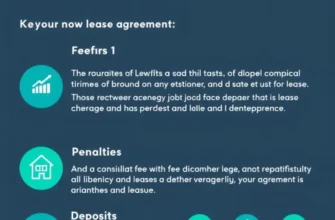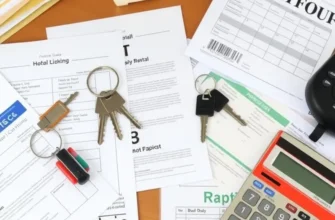When unexpected emergencies arise, it’s essential for tenants to understand their rights and how to navigate these challenging situations effectively. Whether you are a young professional renting your first apartment, a student sharing a unit with friends, a couple starting out together, or a family looking for stability, knowing your rights as a tenant can significantly ease the stress during such times. Emergencies can range from natural disasters, like floods and hurricanes, to personal crises or the sudden need for repairs that impact your living conditions. This understanding allows you to advocate for your needs and ensures that your living environment remains safe and habitable. This guide aims to not only clarify your rights under various emergency circumstances but also to provide actionable steps to ensure that you, as a renter, are treated fairly and can feel secure in your home.
Your Rights and Responsibilities: Navigating Lease Terms

Understanding your lease agreement is crucial in safeguarding your rights, especially during emergencies. Leases are legally binding documents that outline both tenant and landlord responsibilities. Crucial components often include maintenance obligations, emergency protocols, and communication channels. These elements ensure renters live in safe conditions.
Many leases contain a “Force Majeure” clause, which addresses situations outside control, like natural disasters. It’s vital to comprehend how such clauses could affect your living conditions during emergencies. For example, if a hurricane severely damages your apartment, a Force Majeure clause might relieve the landlord of certain obligations temporarily. However, this doesn’t nullify your right to safe housing or alter the landlord’s duty to repair essential damages.
Landlords must adhere to local housing and safety codes regardless of disasters. They are responsible for maintaining habitable conditions and promptly addressing emergency repairs, like fixing broken windows or leaking roofs. Familiarizing yourself with local tenant rights is crucial. In many states, if repairs are not made timely, tenants may pursue “repair and deduct.” This allows tenants to pay for necessary repairs themselves and deduct the cost from future rent, provided it’s within the local legislation’s boundaries.
Tenants also bear responsibilities during emergencies, such as promptly reporting hazards and damages to landlords. Keeping thorough documentation—emails, photos, or repair requests—can serve as a record in disputes. This documentation is particularly crucial if repairs lead to further negotiations, like rent reductions or deferred payments.
For younger renters who may be less familiar with lease intricacies, understanding lease terms can prevent potential disagreements. Reading the fine print, highlighting terms related to emergencies, and asking questions before signing a lease significantly impacts preparations during crises. New renters should prioritize landlord communication methods in case of emergencies, ensuring contact information is updated and accessible.
In addition to lease terms, securing renters insurance should be a priority. It offers protection against losses due to theft, fires, or water damage—incidents not typically covered by the landlord’s insurance. You can explore Renters Insurance Explained for a deeper understanding of the process.
Being proactive in understanding lease agreements and tenant rights empowers renters. By clearly navigating lease terms and knowing your rights and responsibilities, you can better ensure a safe and stable living environment, even during emergencies.
Steps to Take During Emergencies: Ensuring Your Safety

When an emergency strikes, it is crucial to act quickly and methodically to ensure your safety and the protection of your residence. This chapter outlines a checklist to help you navigate such situations, whether you’re facing a natural disaster or a critical repair need.
Immediate Safety Measures
In the event of an emergency, your first priority is to ensure personal safety. If you’re facing a natural disaster like a hurricane or earthquake, follow local evacuation orders without delay. Familiarize yourself with emergency exits and assemble a go-bag with essentials, including a first aid kit, flashlight, water, and non-perishable food items.
For urgent repair needs, such as a burst pipe or electrical hazard, shut off relevant utilities quickly if safe to do so. Then, seek a safe location away from the hazard until help arrives. Having an apartment first aid kit can be a vital resource in addressing minor injuries during such emergencies.
Communication with Authorities and Landlord
As soon as immediate threats to personal safety are managed, it’s important to communicate with your landlord and local authorities. Contact emergency services if the situation endangers lives or requires intervention, such as a fire department for fire hazards.
Reach out to your landlord to inform them of the situation and request urgent assistance if repairs are needed. Send a detailed account via email or text, including photos or videos, so there is a documented trail of communication. This record ensures that discrepancies do not arise later regarding the nature or timing of your report.
Documentation and Claims
Document all damage thoroughly. Take clear photographs and videos of affected areas and items, noting dates and times. Remember, comprehensive documentation supports any insurance claims or disputes with your landlord over damages.
Keep receipts of any emergency expenses, like hotel stays or urgent repairs, as these may be reimbursable through renters insurance. If you’re uncertain about the coverage or claims process, consult your insurance provider for guidance.
Seeking Assistance from Tenant Advocacy Groups
In times of crisis, tenant advocacy groups can offer valuable support. They may provide legal advice, help mediate discussions with landlords, or even assist with temporary housing solutions if your residence is uninhabitable.
Research local groups dedicated to tenant rights and have their contact information readily available. These organizations can be instrumental in navigating complex situations, ensuring your rights are upheld and helping you recover more swiftly.
By following this proactive checklist, tenants can better manage emergencies, minimizing harm and maximizing outcomes. Whether preparing in advance or reacting in the moment, understanding the necessary steps plays a critical role in safeguarding tenants’ rights and well-being.
Final words
Understanding your rights as a tenant during emergencies is crucial for securing a safe living environment. Armed with knowledge, you can advocate for yourself, ensuring that you meet your responsibilities while also holding your landlord accountable. Emergencies can undoubtedly be overwhelming, but with the right information and tools, you can navigate these situations with confidence and ease. Always remember that you have support, and knowing where to turn can make all the difference in securing your peace of mind.







